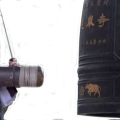


























Welcoming all to build community.
In Thích Nhất Hạnh’s book Going Home, there is a short chapter called Finding Refuge in the Island of Self . In it, he shares his own path to finding and creating community. It is simple to see companions in other people, but we also can find community within ourselves, with other creatures and within the teeming life of our planet itself.
When the Buddha was eighty years old and about to die, he told his disciples they should take refuge in the island of self (attadipa). Because if they go back to themselves and look deeply, they will touch the Buddha [insight], the Dharma [teachings] and the Sangha [community] in themselves. This still remains a very important practice for all of us. Every time you feel lost, alienated, cut off from life, or from the world, every time you feel despair, anger, or instability, you have to know how to practice going home. Mindful breathing is a vehicle that you use to go back to your true home where you meet the Buddha, the Dharma, and the Sangha. Mindful breathing brings you home — it generates the energy of mindfulness in you. Mindfulness is the substance of a Buddha.
The Sangha, the community, is a wonderful home. Every time you go back to the Sangha, you feel that you can breathe easier, you can walk more mindfully, and you can more fully enjoy the blue sky, the white clouds, and the cyprus tree in your yard. Why? Because the Sangha members practice going home all day, through walking, breathing, cooking, and doing their daily activities mindfully.
There are things that you don’t do easily when you are alone. But surrounded by members of the Sangha, suddenly things become easy. You don’t need to make much effort to do them, and you enjoy doing them a lot.
Sangha is the door of our true home.

The Sangha of the Falling Rain was invited to practice in the Autumn of 2018. Located in the Poblenou neighborhood of Barcelona, our aspiration was to nurture a local, multilingual and family-friendly practice community in the northern part of town, companion to the Sangha of the Present Moment and the Sangha of Barcelona in Gràcia, in different parts of town, and the Sangha in Maresme just north of the city (link unavailable).
We found a wonderful home for the Sangha in a century-old cooperative, home to generations of community builders. The global pandemic arrived in Barcelona as we were finishing our plans to meet there, and our founding members were either shut in or relocated to other parts of the province. The inspiration and activities of our circle picked up again after attending the 2020 Plum Village online Rains Retreat. A number of participants were interested in continuing daily and weekly practices, and we created a virtual Sangha space on the internet.
Today we have members from across Europe, North America, Vietnam, Nepal, and other locations. We do not meet in person, but are grateful for the opportunity and ease with which we can begin and end the day with chanting, crossing the world without having to cross town.
We train in and maintain the mindfulness practice of Householders. The clutter of family life and the demands of daily business are fertile soil: deep caring and commitments are seeded and watered, and the fruits nourish practitioner, family, colleagues, and community alike.
Being Peace does not begin and end in a meditation hall, but is a way of being in the world that we cultivate together. Finding strength and energy in our practice, we engage with local and global issues around us.

Zen Master Thích Nhất Hạnh (Oct 11, 1926 — Jan 22, 2022) is a global spiritual leader, poet and peace activist, revered throughout the world for his powerful teachings and bestselling writings on mindfulness and peace.
His key teaching is that, through mindfulness, we can learn to live happily in the present moment — the only way to truly develop peace, both in one’s self and in the world.
Thích Nhất Hạnh published over 100 titles on meditation, mindfulness and Engaged Buddhism, as well as poems, children’s stories, and commentaries on ancient Buddhist texts. He sold over three million books in America alone, some of the best-known include Being Peace, Peace Is Every Step, The Miracle of Mindfulness, The Art of Power, True Love and Anger.
Thích Nhất Hạnh brought his heart-felt and pragmatic Buddhism to the West, founding six monasteries and dozens of practice centers in America and Europe, as well as over 1,000 local mindfulness practice communities, known as sanghas.
He built a thriving community of over 600 monks and nuns worldwide, who, together with tens of thousands of lay students, apply his teachings on mindfulness, peace-making and community-building in schools, workplaces, businesses – even prisons – throughout the world.
Thích Nhất Hạnh[…] is a gentle, humble monk – the man Martin Luther King called “An Apostle of peace and nonviolence.” The media has called him “The Father of Mindfulness,” “The Other Dalai Lama” and “The Zen Master Who Fills Stadiums.”
This biographical text transcribed from the website of our “Root Sangha” Plum Village.
The Sangha of the Falling Rain is purely a social organization. There is no company or non-profit status, and no bank account or other structures to give it shape. Everything we are is a sum of our members, and everything that we do is a result of our collective effort, Going as a River. Still, there are a few non-human elements that are useful in supporting our activities and that help our members prosper in their practice. These have been chosen for simplicity and low cost, though certain activities, such as website design and maintenance, rely on special skills to perform.
You can help nourish this Sangha Body. Listed below are the kinds of energy that raise us up; you can click the headings to learn a little more about each. Nourishing can take many forms; the most important of all is your beautiful presence.
There is no community of practice without the community! The vitality of the Sangha Body is the sum of our aspirations and of our actions. When a few of us gather for a Morning Chant, the Morning Chant is there; when a few gather to share their practice and the challenges of their lives, then Dharma Sharing is born, together with its value. When one of us prepares to enter our “meditation hall” on line, and does so secure in the knowledge that others will also be present, then a living, breathing Sangha is smiling and present.
Dwelling in the refuge of sangha
Shining light that supports me
Keeping my practice free from obstruction.
This kind of contribution is effortless, asking only for the energy of attention and commitment. It is like arriving, like coming home, where you can take a deep and nourishing breath, relax, and smile.
There are a number of ways we care for our living Sangha. Some of us, when listening deeply, recognize a little suffering – something that perhaps he or she as an individual, or we as a community, can address with more mindful action. Others might remember or discover a favorite practice, and bring it to the attention of the community, so that we might incorporate some elements in our daily or weekly activities.
Sometimes, the words or actions of a members or a partner can stir up complex and strong emotions in one or more of us. When those emotions become attached to another member, it can be helpful to have accompaniment to clear the obstruction.
We also have normal entries and exits from the community. Sometimes, those who have been close to us find their lives and their activities moving in another direction. Or perhaps, a major personal event takes place, and one is not able to continue practicing for a period of time.
We listen carefully to the sound of the path underfoot and, if we hear rough road, we may wish to invite action in the community to smooth our travel. The Lighting the Path group is dedicated to this listening for the community, as the community. Composed of a few long-term members they meet once a month (or as needed) to help maintain the health of the community. This group asks for the energy of time and compassion, and for the “wisdom of the circle”.
We are chiefly an online Sangha, and so we depend on our internet home for our regular schedule, guidance in our practices (based on the Monastic activities in the Plum Village tradition), and easy access to materials such as our song list, guided meditations, and regular chants and reading.
A website has a few recurring costs: registration and maintenance of the internet domain FallingRain.org and the hosting service that is the address on the web for our website are both billed annually. The cost is not high.
Our website also has intangible costs in its design, development and maintenance. These efforts have always been a “labor of love”, which means that there has been plenty of labor, while the result of that labor brings great satisfaction and joy. In the same way new life is carried by a mother for months, is brought to the world through labor and birth, and becomes its own beautiful reason for being.
If one contracted a company for web development, the cost would be pretty high, and the results disappointing. There would be little love.
There is also ongoing content management. To support our changing and deepening practices, we add new materials from existing texts or new writing. These are formatted for the web site and published. We also update our own information and materials when the source material from our Root Sangha of Plum Village changes.
Finally, while we practice in “international” English, the Sangha website is available for translation and use by those speaking Castilian Spanish or Catalan. If there is a call for our main pages and navigation to appear in other languages, this can be done by skilled translators.
Much of the energy needed here is either technical in nature – where those with related experience might pitch in – or is supported by the greater community with small donations.
We are a global community, and we are visible wherever the internet takes us. We have an email account receiving queries from the website or other request for information. We also are using Google Groups for simple mailing list management. The email account has a recurring monthly cost, while the distribution groups are free (but cost a little in privacy).
The fabric of our community rests in the practices we share via inline meetings. We have our own Zoom account, which has an annual license fee. This is a little more expensive for one person to pay, but with a community dividing the cost of meeting, the cost is only a few euros per month.
The foundation of a community is shared practice, and we keep a calendar up-to-date so that our members can always connect at the right time, while new friends can easily find us. We might include special events like A Bite of Cake, or new regular events as they arise. The calendar is stored in a web standard called iCal, and is managed using free web tools.
We also revisit scheduling as seasons and needs change. We use a free polling software called When2Meet, that allows us to specify a day or range of days, and times within those days, to identify practice schedules that can meet the needs of the majority of participants.
While the tools are all free, the effort to write, poll, report and publish changes in schedule takes time and a but of administrative energy,
The life of a living body requires energy, and returns energy. When there is a surplus of energy, new life appears! The life of our Sangha Body needs vital energy in the form of presence, actions and investment.
Consider giving some of your energy so that this beautiful Sangha Body grows stronger and brighter. If you have time to donate to some of the activities listed above, and an aspiration to grow in your practice by doing so, please contact the Falling Rain [rain] list to learn more. Consider as well setting up a financial contribution to support the modest recurring costs of our community. We are the Sangha’s Body; the website, the communications and the scheduling are the Sangha’s robes. You can click the button below to create a contribution via PayPal.
Bowing in gratitude to all the forms of energy that feed our family.